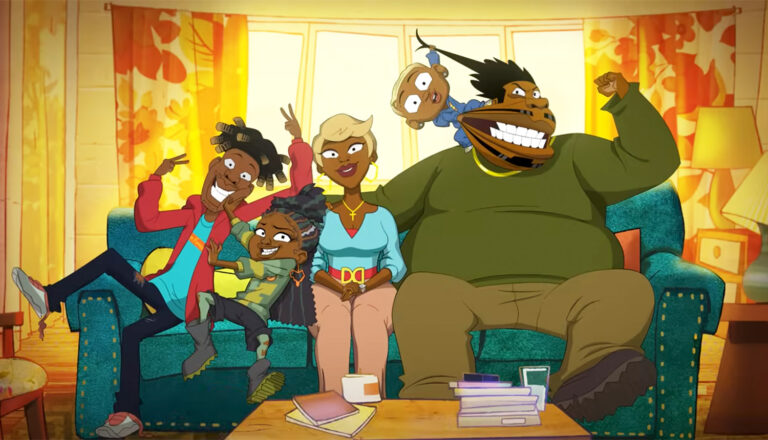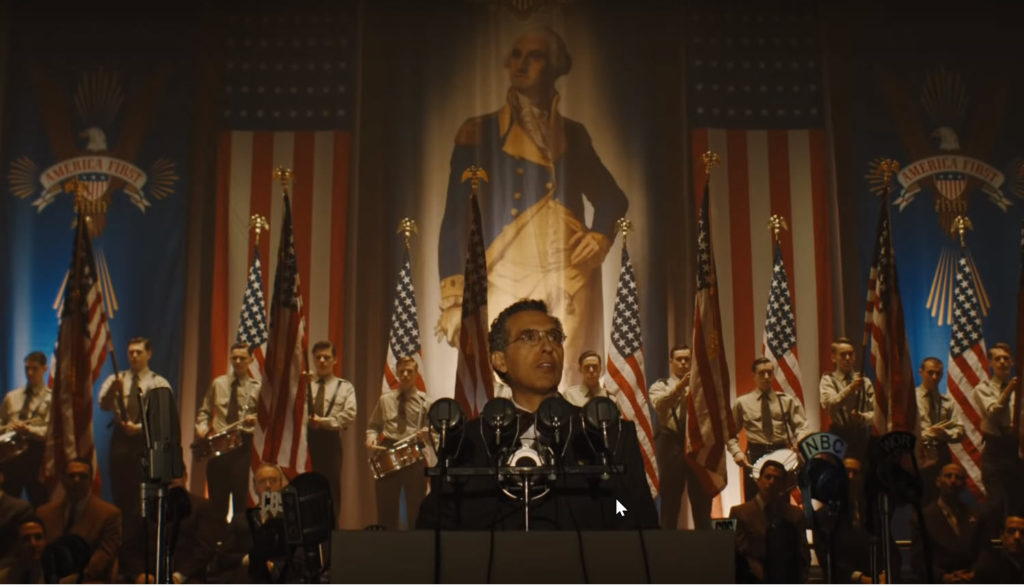
Good Times
Netflix takes a classic sitcom, Good Times, and turns it into a vulgar, violent, sexually-charged TV-MA show.

“We don’t need another homeland, right?”
That’s what 7-year-old Philip Levin worriedly asks his father after two rabbis come asking for donations to create a Jewish homeland in Palestine. The United States, after all, is Philip’s homeland. His neighborhood in Newark, New Jersey, is all he’s ever known. No one would make him leave it … would they?
But his father worries. Some, even here in America, might want to try. And in this revisionist version of 1940 America, they might just succeed.
The world seems on fire that summer. France has surrendered to Nazi Germany with barely a whimper. Adolf Hitler is literally dancing in the streets of Paris. Great Britain is the last European country putting up a fight, but that proud people might not be able to do so much longer.
The United States isn’t fighting … yet. But everyone knows that Franklin D. Roosevelt is sympathetic to the English. Much of America is wary of fighting another war. Into that season of discontent wades Charles Lindbergh, the first man to fly solo across the Atlantic Ocean. He throws his hat in the ring as the Republican challenger to FDR, and he promises to keep the U.S. out of war.
He doesn’t seem to have a prayer of winning. A celebrity? Run for the highest office in the land? Herman Levin dismisses him out of hand.
But he and millions of others underestimate him. Lindbergh sweeps into office. And while anti-Semitism has long been an issue in the U.S. of A., the Levins will see it rise to frightening new levels.
The Plot Against America, based on a 2004 novel by Philip Roth, presents viewers with a “what if” scenario—a less extreme version, if you will, of Amazon’s The Man in the High Castle. High Castle asked, “What if the Axis won World War II?” Plot simply queries, “What if Lindbergh became U.S. President before World War II?” And perhaps a Lindbergh victory wouldn’t have been out of the question. He was, after all, a national hero—but one who, in real life, did seem to have some regard for Nazi Germany (he received a medal from Luftwaffe chief Hermann Göring in 1938 and refused to return it). Later, Lindbergh expressed what many would consider to be anti-Semitic views.
In his original book, Roth tried to adhere to actual history as much as possible—excepting, of course, Lindbergh’s candidacy. And because Roth himself was 7 years old in 1940, much of the story is seen through his avatar’s eyes, and through the experiences of his family.
But for David Simon, who created The Wire and now heads Plot, Roth’s book has taken on extra resonance because of current events, and Simon’s take helps explain why it found a home on HBO more than 15 years after its release.
“It seems startlingly prescient in that it anticipates a politician who seizes upon a very simple message and is able to activate the worst fears and impulses of a significant number of Americans,” he told Variety. “He gets them to relinquish not only power, but some of the most essential bulwarks of self-governance.”
So clearly, any parallels between this fictional version of 1940 and present-day politics are no accident. Simon’s own feelings on our current national climate (and what it all might come to) are, while veiled, certainly not subtle.
That’s not the only element to consider before watching, of course. The miniseries, airing as it does on HBO, has some content issues, as well. While Plot rarely feels gratuitous, viewers will certainly be exposed to scenes of violence and gore, some of which can be quite jarring. Sexual themes have a persistent if not overbearing presence. And the language can be plenty of rough, including scads of ethnic slurs.
The Plot Against America makes for a provocative, if difficult, watch. And for those who land in a certain political camp, this show might be simply infuriating. Still, if we simply take the story at face value, it’s a good reminder that no country’s citizens are inoculated from fear and panic, or from the evil that can flourish in the fever.
Charles Lindbergh announces his candidacy for President of the United States—news met with conflicting emotions in the Levin family. The aviation hero seems disturbingly chummy with Nazi Germany, and the fact that he’s made some anti-Semitic remarks seems to excuse that prejudice for everybody. Father Herman Levin doesn’t think Lindbergh has a prayer of winning, yet he’s worried about what his candidacy might spark. But Herman’s oldest son, Sandy, harbors a secret admiration for the “Lone Eagle,” and he secretly sketches a portrait of him. Meanwhile, Herman’s wayward nephew, Alvin, has taken to beating up apparent Nazi sympathizers with his friends.
The attack was made in response to a savage beating that one of Alvin’s friends suffered. His face is incredibly raw and disfigured. “I’m tired of turning my cheek,” Alvin says before going out to return the favor.
Alvin and a couple of his fellows take on two men staggering home from what appears to be a Bavarian hot spot (complete with German music and a large photograph of Lindbergh). “They look kind of drunk,” one asks. “Is that fair?” No matter: The beating is savage, with ethnic slurs hurled in both directions. The victors (Alvin and his friends) are exultant, though they all bear some cuts and scratches on their face. Meanwhile, Herman watches newsreel footage from the war, in which we see photos of the dead, dying and disfigured.
One brief newsreel clip seems to depict a naked woman running in front of the camera. Eva, sister to Herman’s wife, Bess, is in a relationship with a married man. The two meet at a hotel, and we see them in bed together (Eva in a slip, and the man eventually climbs out of bed and we see him in his boxers). The two kiss passionately once or twice, but Eva apparently breaks off the relationship when she realizes that he’s not going to divorce his wife.
A classmate passes a note to youngest son Philip in class—a note that turns out to be a drawing of a naked woman. Later, Philip goes to the classmate’s house, and the classmate invites Philip to touch all his mother’s underwear. (He strokes one of the woman’s silky nightgowns, but draws the line at her bra.)
Alvin is accused of stealing, and he’s fired from his job because of it. (He denies it to his cousin Sandy, insinuating he was covering for a friend.) We see and hear some Jewish prayers, along with plenty of evidence of anti-Semitism—some subtle, some not so much.
A man drinks from a flask. Others imbibe wine. We hear about a dozen f-words and five s-words. Characters also say “a–,” “b–ch,” “b–tard,” “crap,” “d–n,” “h—” and an extremely vulgar reference to oral sex. God’s name is paired with “d–n” four times.


Paul Asay has been part of the Plugged In staff since 2007, watching and reviewing roughly 15 quintillion movies and television shows. He’s written for a number of other publications, too, including Time, The Washington Post and Christianity Today. The author of several books, Paul loves to find spirituality in unexpected places, including popular entertainment, and he loves all things superhero. His vices include James Bond films, Mountain Dew and terrible B-grade movies. He’s married, has two children and a neurotic dog, runs marathons on occasion and hopes to someday own his own tuxedo. Feel free to follow him on Twitter @AsayPaul.

Netflix takes a classic sitcom, Good Times, and turns it into a vulgar, violent, sexually-charged TV-MA show.

While its protagonist might live a nuanced life, The Sympathizer’s problematic content can’t be described the same way.

Say hola once again to the iconic explorer in this faithful reboot of the children’s series.

Based on a popular video game, Ark: The Animated Series features hungry dinosaurs, bloodthirsty people and plenty of problems.